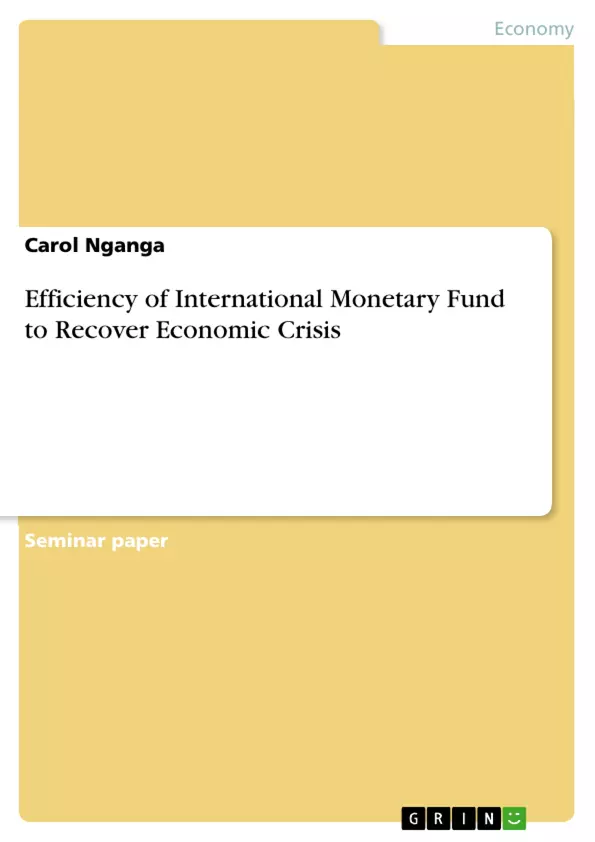Most of the economies in the world ended up in the bottom of a global recession that led to a massive business contraction. This led to a rise in unemployment and shrinking in government revenues. In recent statistics, large industrialized economies have begun to recover from the global recessions (Copelovitch, 2010.p.304). Many industrialized countries and emerging and developing nations have adopted economic stimulus schemes to rescue their economies from the economic scourge. Many countries have resulted to borrowing from the International Monetary Fund to add to their investments packages. This crisis exposed the fundamental weaknesses in the global markets demonstrating how current economies are greatly interdependent resulting to complex policy dilemmas (Khang, 2010). Countries have adopted a four phase plan that will enable them cope up with the crisis and are able to stabilize their economies. This include making interventions to restore confidence in their systems, putting measures to contain the aftermaths of the crisis, developing new policies in their financial systems that will reduce the risk and prevent future crisis. This has been implemented through international leaders converging to put policies, and give political backing in enforcing the proposed policies. The most important phase is the fourth phase that deals with political, social and security effects of the global financial crisis. This paper discusses the efficiency of the International Monetary Fund to recover economic crisis giving a comparison of Malaysia and Korea.
The IMF is an enormous IGO with over 185 countries that was established in 1944. In the emerging global economy system, the IMF plays an important role despite its policies which are westernized being questionable. This is as a result of offering to help non western nation states that do not subscribe to liberal economic policies (Yoon, 2005, p.182). IMF offers a three package which include financial assistance, structural reforms and macroeconomic policies for economic sustainability. There has been a controversy on whether the IMF is an independent global controller which was best displayed by countries such as Malaysia and Indonesia rejecting the offers during the Asian financial crisis (Copelovitch, 2010.p.304). The issue of whether the IMF is capable of creating a positive relationship among nations can be put under question but not the reality that the global economy needs a stronger financial IGO. [...]
Inhaltsverzeichnis (Table of Contents)
- Introduction
- The Role of IMF in the Global Economy
- Korea vs. Malaysia
- Relevance of the IMF in the Global Economy
Zielsetzung und Themenschwerpunkte (Objectives and Key Themes)
This paper aims to discuss the efficiency of the International Monetary Fund (IMF) in recovering economic crises, comparing the experiences of Malaysia and Korea.
- The role of the IMF in the global economy, including its history, structure, and policies.
- The Asian financial crisis of 1997 and its impact on Korea and Malaysia.
- The effectiveness of IMF intervention in economic crises, focusing on the cases of Korea and Malaysia.
- The relationship between the IMF and its member countries, particularly the potential for politicization and the issue of conditionality.
- The relevance of the IMF in the modern global economy, considering its role in crisis management and promoting financial stability.
Zusammenfassung der Kapitel (Chapter Summaries)
- Introduction: The paper introduces the global economic crisis and the role of the IMF in providing financial assistance and policy guidance to countries in need. It highlights the importance of the IMF in managing global economic challenges and its potential impact on countries' economic stability.
- The Role of IMF in the Global Economy: This section explores the IMF's history and its evolving role in the global economy. It addresses criticisms of the IMF's policies and how it has been perceived in both industrialized and developing countries. The section highlights the IMF's role in providing rescue packages during the Asian financial crisis of 1997, including structural and institutional reforms aimed at improving governance.
- Korea vs. Malaysia: This chapter compares the experiences of Korea and Malaysia during the Asian financial crisis. It analyzes the reasons for the crisis, the specific challenges each country faced, and their respective approaches to seeking assistance from the IMF. The chapter examines the IMF's conditionalities imposed on Korea and Malaysia's decision to reject IMF assistance.
- Relevance of the IMF in the Global Economy: This section focuses on the IMF's continued relevance in the global economy, particularly in the context of the global financial crisis of 2008. It discusses the evolving role of the IMF in providing financial assistance and policy guidance to countries facing economic challenges. The section emphasizes the need for international cooperation and the importance of the IMF in promoting global financial stability.
Schlüsselwörter (Keywords)
The text focuses on the International Monetary Fund (IMF), economic crises, global financial stability, financial assistance, policy guidance, conditionality, globalization, Asian financial crisis, Korea, Malaysia, and the role of the IMF in the global economy.
- Citation du texte
- Carol Nganga (Auteur), 2012, Efficiency of International Monetary Fund to Recover Economic Crisis, Munich, GRIN Verlag, https://www.grin.com/document/280532



